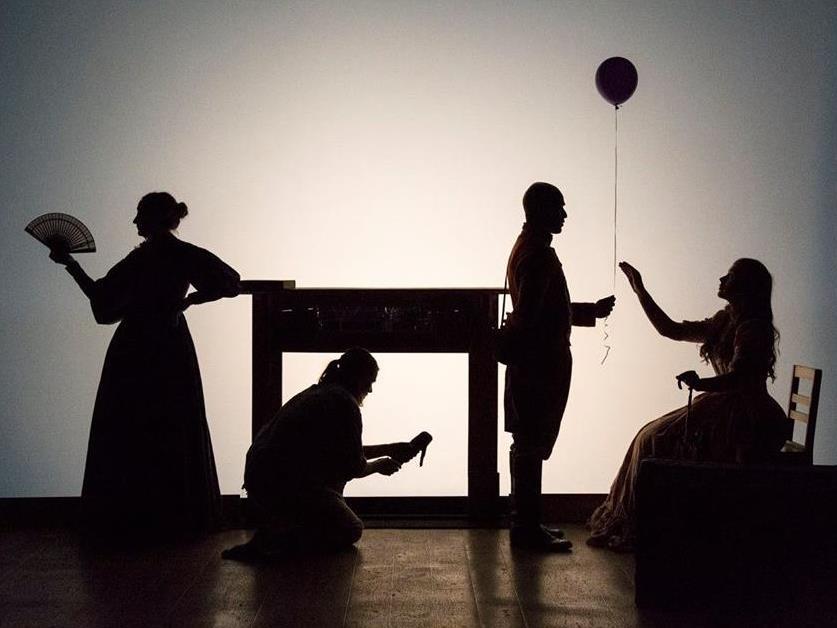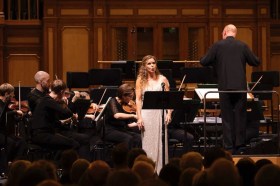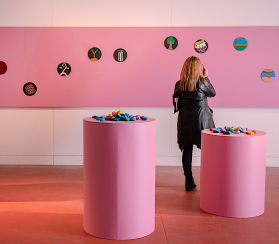Photo: Pia Johnson
At the start of Zoey Dawson’s latest play, she quotes reviews that have called her work ‘self-indulgent’. It’s not an isolated incident – this is a fairly frequent blight on Dawson’s work. In a recent workshop, performance maker Brian Lobel suggested that claims of ‘self-indulgence’ are often used to keep marginalised or provocative voices and experiences silenced. For me, this seems to be the case with Dawson, and especially with this most recent work – anyone who would accuse Conviction of self-indulgence should sit down and rethink themselves. This work is generous, provocative, urgent, entertaining, and mind-bendingly clever.
As with much of Dawson’s work, the piece starts from herself. In voiceover, we hear Dawson wake up, hungover, thinking about the play she feels she has to write – only this time, it can’t be about her. Despite the voiceover pointing to the fact that she has already failed in her task, what follows is a day in the life of a female playwright trying desperately to write something of ‘value’ (and therefore not about herself), all whilst contending with unruly housemates, a nagging mother and a domineering, self-righteous partner. But this is not your typical 20-something sharehouse dramedy, either – Dawson deftly weaves around herself three concurrent realities: a 19th century colonial drama, a post-apocalyptic future, and a version of her anxiety-ridden present. As the day wears on, each of the realities she constructs shifts, cracks, and ultimately falls away, leaving the play and its writer scrabbling to construct a new reality in its wake. Despite illusions to the contrary, Dawson is always in control. Chekhov’s gun gets a memorable look-in, and the writer’s notebook travels with her through each new iteration of reality.
Every aspect of this production is superb. Director Declan Greene takes on the obstacle course of Dawson’s shifting realities with grace and glee. Ruby Hughes gives generously to the demanding role of Lillian/Zoey. Caroline Lee is superb as always, with a peculiarly moving turn in the apocalyptic segment of the play. Dushan Philips balances supreme comic timing with simmering violence in his roles across the piece, and Troy Reid is adorable as the convict-slave ‘Mud’. And the design of stage, sound, lighting and digital projection come together in supporting and fleshing out the physical manifestation of Dawson’s chaotic interior landscape.
There are myriad complex offers in this work, and I didn’t always find myself in agreement with its politics. But whatever else it was doing, it was always a provocation, and a feast for complex thought. For me, the most interesting provocation in the work is around femininity and self-obsession. Without question, the character of Lillian/Zoey entirely crosses the line of what could be considered an ‘acceptable’ level of self-obsession and self-loathing. But in crossing that line, she also asks her audience to find that line within themselves. What do we consider to be an ‘acceptable’ level of self-interest? To what extent is a woman ‘allowed’ to experience and display her internal life, particularly when that internal life isn’t always pleasant? And who gets to police that line? It’s a genuinely interesting provocation, and will, I’m sure, stay in my mind in the days and weeks to come.
At one point in the play, ‘Zoey’ is questioned on how her play is feminist. ‘I don’t know,’ she says, ‘it just is.’ Dawson is clearly an informed, canny, and conscious feminist; but nor is this line an insincere pretense. In content and in form, this is a feminist work that turns the patriarchal constructions of rational, academic thought and the well-made play into weapons against themselves. In both form and content, Dawson and her team carve away the patriarchal constructions that bind the female artist and her work, and leave us with the raw, uncompromising and beautiful core of her personhood and womanhood.
Rating: 4 ½ stars out of 5
Conviction
By Zoey Dawson
Director and Dramaturg: Declan Greene
Set and Costume Design: Romanie Harper
Lighting Design: Amelia Lever-Davidson
Sound Design: James Paul
Cast: Ruby Hughes, Caroline Lee, Dushan Philips, and Troy Reid
Northcote Town Hall
21 July – 6 August 2016





